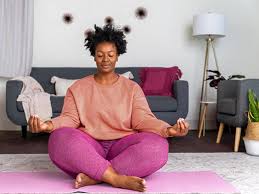In a world full of noise, distractions, and constant demands, meditation offers a quiet refuge. But what exactly is meditation? Is it just sitting in silence, or is there more to it?
Meditation is both an ancient practice and a modern wellness tool. Rooted in mindfulness and self-awareness, it has been used for centuries to calm the mind, improve focus, and promote inner peace. Whether you’re curious about its origins or benefits, this guide will help you understand what meditation is and how it can transform your life.
What Is Meditation?
Meditation is a practice that involves training your mind to focus and redirect your thoughts. It can be as simple as paying attention to your breath or as complex as visualizing specific imagery.
At its core, meditation is about being present in the moment. It helps you become more aware of your thoughts and emotions without judgment, fostering clarity and balance.
The Origins of Meditation
Meditation has roots in ancient traditions and religions, including Hinduism, Buddhism, and Taoism. Over time, it has evolved into a secular practice embraced worldwide for its mental, emotional, and physical benefits.
Some popular forms of meditation today include:
• Mindfulness Meditation (derived from Buddhist practices)
• Transcendental Meditation (focusing on repeating a mantra)
• Loving-Kindness Meditation (cultivating compassion and kindness)
• Body Scan Meditation (progressive relaxation of the body)
Benefits of Meditation
Meditation has been extensively studied for its profound impact on the mind and body. Here’s how it can benefit you:
1. Reduces Stress
Meditation lowers cortisol levels, the hormone associated with stress. Regular practice promotes relaxation and helps you manage life’s pressures more effectively.
2. Improves Focus and Concentration
By training your mind to focus, meditation enhances cognitive abilities and productivity.
3. Enhances Emotional Health
Meditation fosters self-awareness, helping you process emotions and develop a positive outlook on life.
4. Promotes Better Sleep
Practicing meditation before bed can calm the mind and improve sleep quality.
5. Supports Physical Health
Meditation has been linked to lower blood pressure, reduced inflammation, and a stronger immune system.
6. Cultivates Compassion
Practices like Loving-Kindness Meditation can increase empathy and kindness toward yourself and others.
How to Start Meditating
Meditation doesn’t require special tools or a significant time commitment. Here’s how to get started:
1. Find a Quiet Space
Choose a peaceful spot where you won’t be interrupted.
2. Get Comfortable
Sit on a chair, cushion, or floor—whatever feels comfortable for you. Keep your back straight and relax your shoulders.
3. Focus on Your Breath
Close your eyes and take slow, deep breaths. Pay attention to the sensation of air entering and leaving your body.
4. Acknowledge Distractions
When your mind wanders (which it will), gently bring your focus back to your breath. Avoid judging yourself for getting distracted—it’s part of the process.
5. Start Small
Begin with 5-10 minutes a day and gradually increase the duration as you get more comfortable.
Types of Meditation for Beginners
1. Mindfulness Meditation
Focus on your breath, bodily sensations, or surroundings. This practice enhances awareness and reduces stress.
2. Guided Meditation
Use apps or videos to follow a guided session. It’s great for beginners who need direction.
3. Body Scan Meditation
Slowly focus on different parts of your body, releasing tension as you go.
4. Mantra Meditation
Repeat a word or phrase (mantra) silently or aloud to maintain focus and quiet your mind.
Common Myths About Meditation
• “You need to clear your mind completely.”
Meditation isn’t about stopping thoughts; it’s about observing them without attachment.
• “It takes hours of practice to see results.”
Even a few minutes a day can make a noticeable difference over time.
• “It’s only for spiritual people.”
While meditation has spiritual roots, it’s also a practical tool for anyone seeking mental clarity and calmness.
Meditation is a powerful practice that helps you connect with yourself on a deeper level. Whether you’re seeking stress relief, better focus, or emotional balance, meditation can guide you toward a more mindful and peaceful life.
Start small, stay consistent, and be patient with yourself. Over time, you’ll discover the profound benefits of this transformative practice—one breath at a time.
